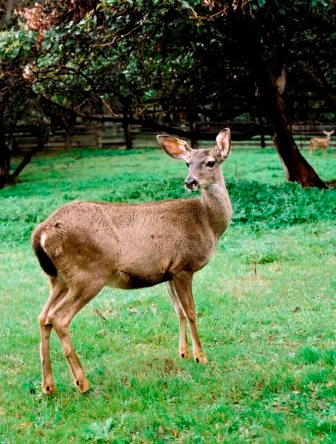
UC Davis researchers and state Department of Fish and Game officials are capturing deer between Dec. 2 and Dec. 15 along a stretch of the freeway from Millbrae to Woodside, said Fraser Shilling (video clip), head of the research project and co-director of the Road Ecology Center at UC Davis.
Using tranquilizer darts fired from a rifle, or "clover traps" (large netting enclosures), about 15 deer are expected to be captured. Researchers plan to capture another 30 deer by the time the project is completed in May 2013.
The deer would be "minimally disturbed" by the darts or enclosures, with the worst harm being from falling down, according to Shilling.
"That's the level of harm," he said. "There's no long-term damage to it."
The captured deer will be fitted with GPS collars that will record their location and send the information to researchers who will use the data to track the deer as they move along the areas adjoining the freeway, or onto the roadway itself.
Timers will automatically release the collars after six months, Shilling said.
Besides tracking the deer, researchers will also use 40 wildlife cameras to capture images of wildlife and map the locations of road kill. The information will be used to make a recommendation to determine what kind of strategies could be used to reduce the number of collisions between deer and other animals on the freeway.
Deer grazing along the side of the freeway and dead deer on the shoulder are common sights along the roadway, which runs through mostly heavily-wooded areas, rolling hills, and grasslands between San Francisco and San Jose.
The deer study, funded by a $320,000 grant through the federal Transportation Enhancement program, will be used to try to reduce the number of collisions between cars and deer on the freeway.
Every year, about 300,000 collisions occur nationwide between vehicles and wildlife, resulting in 200 deaths and 26,000 injuries. The costs associated with deer strikes alone add up to $8.5 billion annually.
Road Ecology Center at UC Davis
“Road ecology” is emerging as an environmental science focusing on the impact of roads on nature, such as how plant and animal populations are fragmented by roads, and how vehicle noise and pollution negatively impact animals and plants.
An understanding of road ecology also allows transportation planners to optimize mobility while minimizing the adverse impact of roads and vehicles.
The UC Davis Road Ecology Center brings together policy makers from transportation and environmental settings to design sustainable transportation systems that complement the needs of natural landscapes and human communities.
Some of the organizations partnering with the Road Ecology Center on projects include Caltrans, the California Department of Fish and Game, the UC Davis Sustainable Transportation Center, the John Muir Institute of the Environment and the Institute of Transportation Studies at UC Davis, and Defenders of Wildlife.
Citizen science
A “citizen science” component of the Road Ecology Center is the California Roadkill Observation System, a statewide roadkill reporting website for people to record their observations of dead animals and their environmental context. The information will be used to reduce the number of roadkill incidents.
The top 5 species of animals killed on California roads and highways are raccoon, striped skunk, California ground squirrel, Virginia opossum, and mule deer (or black-tailed deer).